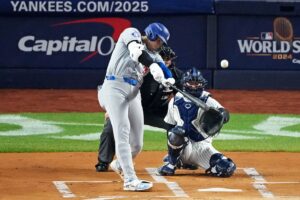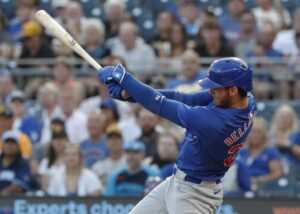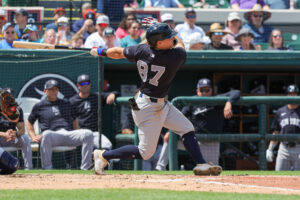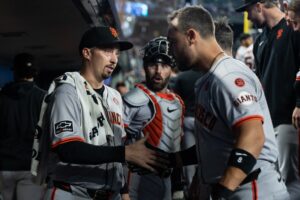The date was December 14, 2003. The St. Louis Cardinals and Atlanta Braves orchestrated a blockbuster trade with significant ramifications for each franchise. The Braves sent starting pitchers Jason Marquis and Adam Wainwright to the Cardinals, along with reliever Ray King. In return, Atlanta received outfielder J.D. Drew and utility-man Eli Marrero. Each team had significant and valid reasons for agreeing to the trade, but few people could have foreseen all the long-term effects.
Revisiting the J.D. Drew Trade
Why Atlanta Made the Trade
The 2003 Braves were an offensive juggernaut. The team scored 907 runs, the only season of 900+ runs for the Braves since the 1800s. Atlanta won 101 games and took the NL East by 10 games. Unfortunately, the Chicago Cubs held the Braves to two runs or fewer three times in a five-game NLDS victory. The Braves were led offensively by three players who posted WAR above six: Marcus Giles, Gary Sheffield, and Javy Lopez. This trio combined for 103 home runs, 316 runs scored, and 310 RBI. Atlanta would lose Lopez and Sheffield to free agency at seasons end.
Despite an already shaky rotation, Atlanta focused on their offensive needs. The Braves were desperate to replace two All-Stars who finished top five in the MVP voting. The front office saw Drew and Marrero as part of the solution and pulled the trigger.
Why St. Louis Made the Trade
The 2003 Cardinals missed the playoffs after three straight trips to the postseason. The offense was effective in ’03, with 876 runs scored. That mark was their second-highest total from 2000-2010. St. Louis was anchored by Albert Pujols, Jim Edmonds, Edgar Renteria, and Scott Rolen. The main problem for the Cardinals in ’03 was a pitching staff that allowed 796 runs.
Drew became an expendable piece for a star-studded offense, especially with an opportunity to improve a struggling rotation. Marquis and King represented two pieces that could contribute right away. Snagging Wainwright, Atlanta’s top pitching prospect at the time, made the deal a no-brainer for the Cardinals.
Immediate Impacts in Atlanta
It is hard to comprehend, but the immediate impact of the trade was indeed a success for Atlanta. Drew posted an 8.3 WAR and appeared in 145 games in 2004 while contributing one of the best seasons in Turner Field history. He also posted career-high numbers in hits, runs scored, triples, home runs, walks, and total bases. His lone season in Atlanta was by far the most effective year of Drew’s career. Marrero also proved an asset while in a Braves uniform. He appeared in 90 games and posted an OPS of .894 with 10 home runs, 40 RBI, and a career-high 2.3 WAR.
The trade worked, but the benefits for the Braves were short-lived. Atlanta won 96 games and another NL East title in ’04, but the ultimate goal of a World Series championship was never realized. The Braves fell to the Houston Astros in the NLDS and lost Marrero and Drew to free agency. Despite fantastic performances during the regular season, Drew and Marrero combined for just five hits and nine strikeouts in the ’04 NLDS.
Immediate Impacts in St. Louis
Marquis and King provided the immediate impact for the Cardinals in ’04. Marquis was one of two St. Louis starters to log 200 innings. He had the second best ERA+ of any Cardinals starter, at 114. King proved to be effective out of the bullpen all season long. He appeared in 86 games and posted a 2.61 ERA over 62 innings pitched. The pair was instrumental in helping the Cardinals reach the World Series for the first time since 1987, where they would be swept by the Boston Red Sox.
Long-Term Impacts
Unfortunately for Atlanta, there were no positive long-term effects of the trade. The Braves gave up three pitchers, including one who has appeared in parts of 11 seasons for the Cardinals. Giving up Wainwright, then a top-prospect, would prove to have a nightmarish impact on the franchise. Marrero and Drew only contributed one season in Atlanta, and the on-field product took a step back following the 2005 season.
St. Louis continues to reap the benefits of this trade even today. Wainwright developed into the type of pitcher everyone believed he could be and remains under contract with the Cardinals through 2018. Since debuting in 2005, Wainwright has amassed 34.4 WAR, 134 wins, 1,487 strikeouts, and holds a career ERA+ of 126 alongside a 3.20 FIP. He has never won a Cy Young, despite four top-three finishes. Wainwright was part of two pennant-winning teams, including the 2006 World Series team.
No trade works out ideally for both teams. The Braves gave up multiple pitchers and a top prospect in hopes of solidifying the offense. While the trade had a desirable immediate impact, the benefits were short-lived and very costly.
Main Photo:






